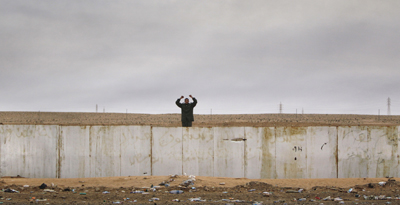New York, March 13, 2011–Unidentified gunmen killed an Al-Jazeera cameraman and wounded his colleague near the eastern rebel-held city of Benghazi in an ambush on Saturday, according to the Qatar-based satellite station. This is the first confirmed journalist death reported in the Libyan conflict, the Committee to Protect Journalists said today.
The Al-Jazeera crew was returning from covering an opposition demonstration in Suluq, 30 miles (50 kilometers) southwest of Benghazi, when unidentified gunmen opened fire on their car, according to Al-Jazeera correspondent Baybah Wald Amhadi, who was traveling with the crew. Wald Amhadi said on the air that cameraman Ali Hassan al-Jaber was hit with three bullets and taken to the hospital, where he died. Naser al-Hadar received one bullet above his ear, causing light injuries. Wald Amhadi said that the type of ammunition used in the attack, disintegrating frangible bullets, was the same type that pro-Qaddafi forces have been using against civilians.
“The identity of those behind this outrage is still unknown,” said Robert Mahoney, CPJ’s deputy director. “But Al-Jazeera has been subjected to sustained invective by pro-Qaddafi forces for its coverage of the Libyan conflict. We join with Al-Jazeera in calling for those behind this attack to be brought to justice.”
Wadah Khanfar, the director-general of Al-Jazeera, said on the air that the attack on the station’s journalists came after “an unprecedented campaign of incitement by the Libyan regime” on Al-Jazeera and its staff. Khanfar vowed that Al-Jazeera will continue its mission to cover unfolding events in Libya and elsewhere. Thousands of protesters gathered on Saturday in Benghazi chanting pro-Al-Jazeera slogans and holding Qatari flags.
Al-Jaber was a Qatar national who was born in 1955 and held a master’s degree in cinematography from the Academy of Arts in Cairo, according to Al-Jazeera. He was previously the director of the Qatar bureau of CNBC Arabiya, an Arabic-language financial and business information channel. He worked in Qatar Television for more than 20 years, as a head of the film department, before joining Al-Jazeera.
“This is an extension of the campaign against Al-Jazeera, and Al-Jazeera Arabic particularly, because everyone here watches Al-Jazeera Arabic,” said Tony Birtley, Al-Jazeera’s correspondent reporting from Benghazi. “Their work has been heroic, and it has been a great shock to lose a colleague.”
Foreign journalists have been hampered by pro-Qaddafi forces since fighting began in February, and one foreign correspondent remains in detention. Libyan authorities had invited international journalists to report from the capital, but pro-Qaddafi forces have constantly hampered their work. The Libyan Foreign Ministry in Tripoli acknowledged that Ghaith Abdul-Ahad, a correspondent for London’s Guardian newspaper, was in state custody, the newspaper reported Thursday.
Al-Jazeera’s signal has been jammed from Tripoli since February 2, the station reported. Saif al-Islam, son of the Libyan leader, Muammar Qaddafi, verbally attacked Arab media outlets on several occasions. “The conspiracy doesn’t come from Libyans but from your Arab brothers who unleashed on you their broadcasters, poisoned words, and false rumors,” he said in a televised speech in February.
Also, at least three local journalists have gone missing after contributing to Al-Jazeera’s coverage from Libya. Atef al-Atrash, a contributor to several Libyan news websites, disappeared shortly after speaking on the air on Al-Jazeera from Benghazi on February 17. Two journalists from Tripoli, Salma al-Shaab, head of the Libyan Journalists Syndicate, and Suad al-Turabouls, a correspondent for the pro-government Al-Jamahiriya, were detained in February. Their detention came after they spoke to Al-Jazeera, according to local news reports.
Since Libya’s political unrest erupted last month, CPJ has documented more than 40 attacks on the press. They include 25 detentions, five assaults, two attacks on news facilities, the jamming of Al-Jazeera and Al-Hurra transmissions, at least three instances of obstruction, and the interruption of Internet service. At least six local journalists are unaccounted for as of today. Numerous journalists have also reported the confiscation of equipment. For details, see our daily coverage:
